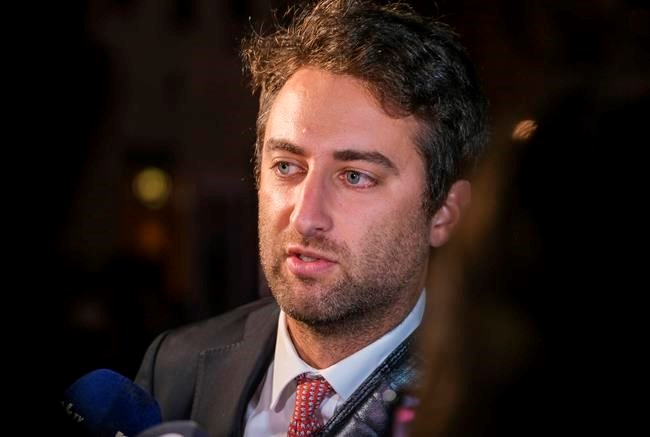VALLETTA, Malta (AP) — A judge in Malta sentenced two brothers to 40 years in prison each after they abruptly reversed course and pleaded guilty Friday to the car-bomb murder of an anti-corruption journalist, which had shocked Europe and triggered angry protests in Malta.
Hours earlier, at the start of the trial in a Valletta courthouse, George Degiorgio, 59, and Alfred Degiorgio, 57, had entered not-guilty pleas over the death of Daphne Caruana Galizia in the blast as she drove near her home on Oct. 16, 2017.
Caruana Galizia investigated suspected corruption among political and business circles in the tiny European Union nation, which is a financial haven in the Mediterranean.
“This is an important step forward, to deliver justice in a case that represents a dark chapter in Malta’s history,” a statement from the office of Prime Minister Robert Abela’s government said shortly after the sentencing.
One of her sons, Matthew Caruana Galizia, told reporters: “I’m relieved that they have been convicted and sentenced. Now it’s about the remaining cases,” he said, referring to prosecution of other defendants.
But he said the five years it took to reach this stage of justice for his mother was “far too long.”
The trial judge, Edwina Grima, retired to chambers after the change of plea before announcing the sentences an hour later.
The two defendants were also ordered to pay 50,000 euros apiece from the money they received as a result of the crime as well as court costs.
They could have faced a maximum sentence of life imprisonment.
Prosecutors alleged that the brothers were hired by a top Maltese businessman with government ties. That businessman has been charged and will be tried separately.
Bringing the trial to an abrupt close, the Degiorgio brothers entered guilty pleas to all of the following charges: willful homicide; causing an explosion which resulted in the death of a person; illicit possession of explosives; criminal conspiracy; promoting, constituting, organizing or financing an organization with a view to commit criminal offenses, and active participation in a conspiracy.
In the run-up to the trial, the Degiorgio brothers had denied the charges. A third suspect, Vincent Muscat, avoided a trial after earlier changing his plea to guilty. Muscat is serving a 15-year sentence.
But at Friday's start of the trial Alfred Degiorgio pleaded not guilty while his brother declared that he had nothing to say which the court interpreted as a not-guilty plea.
It wasn't immediately clear why the defendants abruptly reversed themselves.
During the prosecution's opening arguments, the state argued they had evidence involving cell phones that would link the defendants to the bombing.
The brothers had unsuccessfully tried to negotiate a pardon in exchange for naming bigger alleged conspirators, including a former minister whose identity hasn't been revealed.
The bomb had been placed under the driver's seat and the explosion was powerful enough to send the car's wreckage flying over a wall and into a field.
A top Maltese investigative journalist, Caruana Galizia, 53, had written extensively on her website “Running Commentary” about suspected corruption in political and business circles in the Mediterranean island nation, an attractive financial haven.
Among her targets were people in then-Prime Minister Joseph Muscat’s inner circle whom she accused of having offshore companies in tax havens disclosed in the Panama Papers leak. But she also targeted the opposition. When she was killed she was facing more than 40 libel suits.
The arrest of a top businessman with connections to senior government officials two years after the murder sparked a series of mass protests in the country, forcing Muscat to resign.
Yorgen Fenech was arrested in 2019 and indicted in 2021 for alleged complicity in the slaying, by either ordering or instigating the commission of the crime, inciting another to commit the crime or by promising to give a reward after the fact. He was also indicted for conspiracy to commit murder. Fenech has entered not-guilty pleas to all charges.
No date has been set for his trial.
A self-confessed middleman, taxi driver Melvin Theuma, was granted a presidential pardon in 2019 in exchange for testimony against Fenech and the other alleged plotters. Two men, Jamie Vella and Robert Agius, have been charged with supplying the bomb, but their trial has not yet begun.
In the morning session before a lunch break, Deputy Attorney General Philip Galea Farrugia told the court that Theuma was asked by an unnamed person to find someone to kill Caruana Galizia. Theuma allegedly approached one of the Degiorgio brothers and a payment of 150,000 euros ($146,500) was negotiated, said Galea Farrugia.
Galea Farrugia also said that a rifle was initially selected as the murder weapon, but that was later switched to a bomb. Prosecutors also said that a cell phone — one of three that George Degiorgio had with him on a cabin cruiser in Malta's Grand Harbor — had triggered the explosion.
A 2021 public inquiry report found that the Maltese state “has to bear responsibility” for Caruana Galizia’s murder because of the culture of impunity that emanated from the highest levels of government.
The Council of Europe’s commissioner for human rights, Dunja Mijatović, has decried the “lack of effective results in establishing accountability five years later.”
In a letter to Prime Minister Abela, the commissioner expressed the need for urgency in protecting journalists in Malta and cited defamation cases that are still ongoing posthumously against Caruana-Galizia’s heirs.
___
Frances D'Emilio contributed from Rome.
Kevin Schembri Orland And Matthew Agius, The Associated Press



